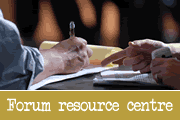Background - Objectives - Opening Plenary - Questions - PDF version - Programme
Countries, communities, and individuals are all dependent on biodiversity. Our planet’s rich variety of genes, species and ecosystems is the foundation which underpins social, economic and cultural diversity. Seventy percent of the estimated 1.1 billion people living in extreme poverty, two thirds of whom are women, live in rural areas, where conservation of biological resources is essential if development is to be sustainable.
The focus of Safeguarding the Diversity of Life is how well-being is enriched though biodiversity, how all people may benefit from having a diverse and varied planet, and what IUCN can do to help ensure that biodiversity is conserved and used equitably and sustainably.
For 60 years, IUCN has been the unifying force for biodiversity conservation and IUCN’s members continue to strongly support and pursue the importance of nature, both for its own sake as well as for humanity. Safeguarding the Diversity of Life will provide numerous examples of how IUCN is continuing and expanding its work in this field.
Over 450 events, including nearly 200 workshops, are contributing to the Safeguarding the Diversity of Life stream. IUCN Members, Commissions, and partners will both showcase their successes and identify new challenges. The events in the stream will address heartland issues for IUCN, especially protected areas, species, ecosystems, and working with local communities.
Over the course of four days we will assess what we know, what we do not know, and what we need to do to understand our world better, enhance sustainability, and significantly reduce biodiversity loss. The stream will profile successful partnerships and lead to new ways that conservation can safeguard life. Special emphasis will be given to generating conservation knowledge and searching for creative solutions. The stream will look for ways to broaden participation, such as collaboration with the private sector and with civil society. The stream will also seek to broaden perspectives, for example exploring how technology can be a key toward conserving nature, or how to fill the gaps between knowledge, practice, and policy.
In the workshops, participants will investigate how managed land and seascapes, including protected areas, deliver ecosystem services sustainably. The strong links between economic, social and cultural factors contributing to the sustainable management of species will be showcased. Success stories from various regions of the world will be presented, including from the Mediterranean region that is welcoming us in Barcelona.
As the core of IUCN’s work and forming the majority of IUCN’s 2009-2012 Programme, the topics being addressed by this stream are ones where IUCN brings considerable experience and knowledge to bear. The stream will seek answers to the major challenges being faced by conservation practitioners around the world and identify new questions that will need to be answered in the coming four years.
The stream will provide a framework for exploring such issues at its 90-minute opening plenary. The key questions that lie at the core of the work of IUCN’s membership will be posed by a panel of speakers and answers will be sought throughout the subsequent four days. With an eye toward action and inspiration for the future, questions such as the following will be asked:
- Wellbeing and Ethics: Is biodiversity a luxury or essential for survival?
- Food security: Can we feed 9 billion people and also stop biodiversity loss?
- Policy and Awareness: How can biodiversity loss have a similar impact on public opinion as climate change?
- Species: Do we need all species? How many species can we really save?
- Private sector: How can IUCN help the private sector learn to support biodiversity?
- Protected areas: How can the key role protected areas play in biodiversity conservation be enhanced?
- Technology: How can technology help or hinder biodiversity conservation?
- Knowledge: What are the priorities for seeking new knowledge and better using the knowledge we have?
Safeguarding the Diversity of Life brings together the membership, commissions, partners, and secretariat to explore how to do the work of conservation better. To this end, the stream will host workshops covering topics such as technical skills, research, community-based conservation, and economics. Questions about how to do the job better will include:
Finance: How do we encourage society to pay for conservation?
Governance: What is the best way to link conservation to other sectors of government?
Sustainable Use: How do we make any use of species sustainable?
Tools: What are the latest approaches to enable us to conserve biodiversity more effectively?
Communication: How can we reach out to an increasingly-urban public?
For four days we will seek to create a unique opportunity for participants to discuss the crucial issues and challenges being addressed by this stream: the role of protected areas in conservation; species conservation and assessment; marine conservation; environmental governance; regional strategies and approaches; sustainable management of natural resources; engaging broad participation in conservation; generating conservation knowledge; conservation finance; and biocultural diversity. All sectors at all levels - public, private, civil society, NGOs, young and old, economic, social and cultural, local and global – will share experience and knowledge, and develop innovative solutions, alliances and initiatives. This interaction will enable IUCN members, commissions, and partners to formulate new commitments and an agenda for action to better connect ecosystem conservation with human well-being in the coming years.





